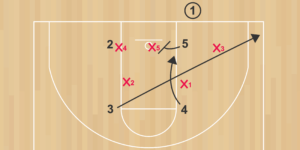Every coach, at some time in their career, should have to coach a youth basketball team.
Coaching younger athletes forces coaches to focus on what really matters, keep things simple, and find the best ways to make practices both engaging and useful for their players.
Here are 7 lessons I’ve learned coaching youth basketball:
1. Keep it simple, stupid
Often, when coaching youth basketball, you don’t get to work with your team every single day. Sometimes you only see them 1-2 times between tournaments.
In an optimal world, you’d have gym access and daily time with your team. This likely won’t be the case for you.
WIth that in mind, you must learn to keep things very simple.
Focus on the things that are truly important and cut out any extra fluff that isn’t going to help your team be ready for their games.
2. Plan in detail, but be flexible
I can’t tell you how many times the length of practice changed last minute, we ended up having access to 2 baskets instead of the 4 I thought we would have, or we only had 6-7 players available to show up for practice.
Flexibility is your friend.
Practices are probably not going the way you picture them in your head or wrote them down on your piece of paper. And that’s okay.
Your ability to adjust on the fly, make changes, and use whatever resources you have – while remaining positive – will go a long way.
3. How to use your time wisely
When you only have an hour to practice once a week, you learn how to use your time more wisely.
Choose the most important things you need to work on and spend the majority of your time there.
The main questions I would ask here are:
- What do we need to be able to do in the game that we can’t do right now?
- What skills are we lacking in?
- What fundamentals of the game do I need to teach my players?
Do those things instead of cute passing drills, silly games, or wasting everyone’s time with long-winded pre-practice speeches.
Also, try to avoid stopping drills if you can!
4. You can not over-communicate.
This is true for players and parents.
With your players, constantly communicate your expectations, what they are supposed to be doing, where they are supposed to be cutting, how playing time works, etc.
When you coach younger athletes, you WILL have to constantly remind them about the smallest of details. And they will still do it wrong during the game. That’s okay. It’s part of the process.
With your parents, communicate in as many ways as possible about things like playing time, practice and game schedules, expectations, volunteer opportunities to help, your rules etc.
Start a small email list with your players, use a text chain, have meetings from time to time.
You can not over-communicate!
5. Keep your practices super engaging and interesting.
Choose drills that will teach your players how to play, but will also be interesting and engaging for them.
Avoid having your players standing in line at all costs.
Enlist parents or siblings of your players to help in drills.
Spend 5-10 minutes on a single thing before moving on. Younger athletes just don’t have the attention span to truly stay focused on the task at hand for longer than this. Introduce it, work on it, move on!
6. This should be fun
Youth sports are supposed to be an enjoyable experience for your players. If they aren’t having fun while getting better, you need to adjust how you’re doing things.
Your players should look forward to practice.
I always made it a personal goal to make sure everyone on my team felt good at the end of the practice – this can be achieved through telling a story or joke that makes everyone laugh, having fun with the post-practice huddle, or ending practice with some sort of contest against coaches.
When they leave, they should leave feeling like they love basketball, they love coming to practice, they had fun with their teammates and friends, and they maybe learned a little about basketball along the way.
7. It’s not about you.
We see it all the time on social media – examples of coaches taking themselves too seriously, stealing the joy of youth sports from kids, and making it all about the reliving of glory days or some made up goal in the future.
Don’t be these people.
Make every decision around how it will impact and benefit your players. Put them first, advocate for them, and drop your ego.
Ten years (days?) from now, nobody is going to care if you won the county youth parks and recreation basketball league. They will care that you helped them love the game, helped them get better, and were a positive adult role model in their lives.






